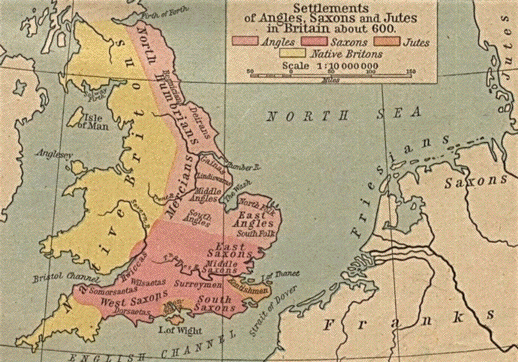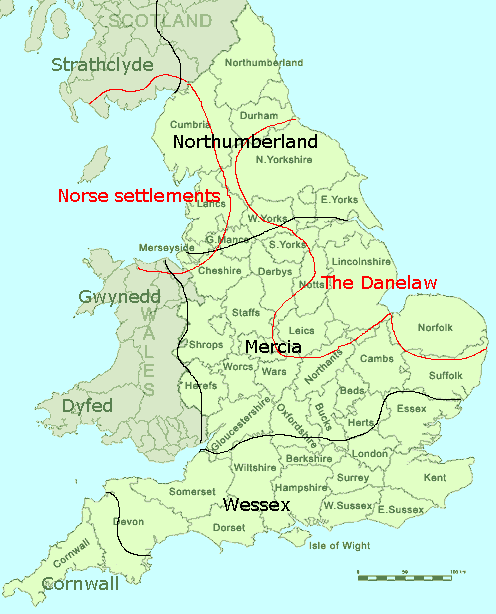The Evolution Of English
The Evolution of English
George Boeree
George Boeree
The English language begins with the Anglo-Saxons. The Romans, who had controlled England for centuries, had withdrawn their troops and most of their colonists by the early 400s. Attacks from the Irish, the Picts from Scotland, the native Britons, and Anglo-Saxons from across the North Sea, plus the deteriorating situation in the rest of the Empire, made the retreat a strategic necessity. As the Romans withdrew, the Britons re-established themselves in the western parts of England, and the Anglo-Saxons invaded and began to settle the eastern parts in the middle 400s. The Britons are the ancestors of the modern day Welsh, as well as the people of Britanny across the English channel. The Anglo-Saxons apparently displaced or absorbed the original Romanized Britons, and created the five kingdoms of Northumbria, Mercia, Kent, East Anglia, Essex, Sussex, and Wessex (see map below). Notice that the last three are actually contractions of East Saxon, South Saxon, and West Saxon, and that the Welsh still refer to the English as Saxons (Saesneg).
The language we now call English is actually a blend of many languages. Even the original Anglo-Saxon was already a blend of the dialects of west Germanic tribes living along the North Sea coast: The Saxons in Germany and eastern Holland, the Jutes, possibly from northern Denmark (the area now called Jutland), and the Angles, probably living along the coast and on islands between Denmark and Holland. It is also likely that the invaders included Frisians from northern Holland and northern Franks from southern Holland (whose relatives gave their name to France). The dialects were close enough for each to understand the other.

Later, in the 800s, the Northmen (Vikings) came to England, mostly from Denmark, and settled in with the Anglo-Saxons from Yorkshire to Norfolk, an area that became known as the Danelaw. Others from Norway ruled over the people in the northwest, from Strathclyde to the north of Wales. The Norse language they spoke resembled Anglo-Saxon in many ways, but was different enough for two things to happen: One, there were many Old Norse words that entered into English, including even such basic ones as they and them; And two, the complex conjugations and declensions began to wither away as people disagreed about which to use!

Last, William the Conqueror and his Norman supporters invaded England in 1066. Although, as their name suggests, they were the descendents of the same Northmen that had invaded England earlier, they had been settled long enough in Normandy in the north of France to adopt a dialect of French. They brought this Norman French with them to England and kept it as the language of their newly imposed aristocracy. In the day-to-day need to communicate, the common language became English, but with a large number of French words, and still more withering of grammatical complexities.
English since then has been absorbing vocabulary from a huge number of sources. French, the language of diplomacy for Europe for centuries, Latin, the language of the church, and Greek, the language of philosophy and science, contributed many words, especially the more "educated" ones. Other European languages have left culturally specific words. The American Indian languages, Australian Aborigine languages, and the languages of Africa and India gave us many hundreds of words, especially for the innumerable species of plants and animals of the world. On top of all this, there is the steady creation of new words and new uses for old words by the many subcultures of the English speaking world.
English's closest relatives can be found right across the water in Holland and Germany. It's very closest relative is Frisian, spoken in northern Holland and the islands running along the coast from Holland up into Denmark. Notice some obvious similarities:
English Frisian Dutch GermanFrom Brea en Griene Tsiis: Bread and Green Cheese by William Z. Shetter [http://home.bluemarble.net/~langmin/]
as as als als
bread brea brood Brot
chaff tsjêf kaf Kaf
cheese tsiis kaas Käse
church tsjerke kerk Kirche
cow kou koe Kuh
day dei dag Tag
dove dou duif Taube
dream dream droom Traum
ear ear oor Ohr
flea flie vlo Floh
flown flein gevlogen geflogen
fly fleane vliegen fliegen
goose goes gans Gans
great great groot gross
ground groun grond Grund
hail heil hagel Hagel
head haed hooft Haupt
heap heap hoop Haufe
hear hear hoor Hören
him him hem ihm
is is is ist
it it het es
lain lein gelegen gelegen
lay lei lag lag
nail neil nagel Nagel
need noot noot Not
nose noas neus Nase
rain rein regen Regen
salt sâlt zout Salz
say sei zeg sag
seed sied zaad Saat
sleep sliepe slaap schlaff
soft sêft zacht sanft
think tinke denken denken
thought tocht dacht dachte
through troch door durch
thumb tomme duim Daum
to to toe zu
Tuesday tiisdei dinsdag Dienstag
under ûnder onder unter
us ús ons uns
way wei weg Weg
yesterday juster gisteren gestern
Comments
Post a Comment